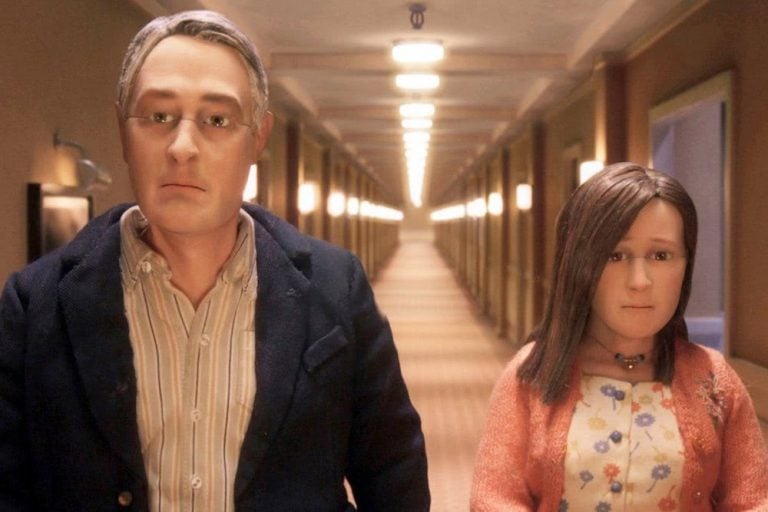Charlie Kaufman should pay someone to whisper encouraging words into his ear. The man is one of the most talented screenwriters and directors currently living, a genius responsible for a brace of the best films of the last decade – namely Synecdoche, New York and Anomalisa – and yet he’s still worried, in his own words, that he’s “blown it”.
Maybe it’s not hard to see why he’s been rattled: Synecdoche haemorrhaged money at the box office, and despite nabbing a well-earned best animated feature nom at the Oscars, Anomalisa struggled to make a return on a rather modest and mostly crowdfunded budget.
But who fucking cares? Some of the finest films ever made have been commercial and critical flops, and some of cinema’s greatest financial hits have sunk into the waters of pop culture consciousness without making so much of a ripple (would any of us be able to recite Avatar’s story beats without checking in on the Wikipedia page to jog our memories?)
If you haven’t seen Anomalisa, Kaufman’s very adult, very galling stop motion masterpiece, the thing’s on Netflix, and is more than worth your time.
Anyway, if you haven’t seen Anomalisa, Kaufman’s very adult, very galling stop motion masterpiece, the thing’s on Netflix, and is more than worth your time. A withering study of depression, the film follows a self-help coach named Michael Stone (voiced by David Thewlis) who lives in a world where everybody speaks with the same voice. Men, women, children; airline pilots and taxi drivers; opera singers and hotel concierges: all of them are voiced by esteemed character actor Tom Noonan, doing his best lilting, insistent drone.
Then, suddenly, Michael meets Lisa (Jennifer Jason Leigh, as excellent as always) – a woman whose voice is as refreshingly new to Michael as it is to an audience who have spent almost an hour of the film’s running time listening to Thewlis interact with a thousand versions of Noonan. But is Lisa really special, or is she just one more grey face in a world of them?
Anomalisa is odd, of course, as that description hopefully makes it sound, but it’s also utterly effective: full of subtle, deeply sad humour; extraordinary performances; an almost unbearably tense dream sequence; and one of the best (and certainly the most human) sex scenes ever put to film. Go on, watch it. Help Charlie fully realise his self-worth.
On the significantly less illustrious front, Netflix have also nabbed John R. Leonetti’s Wish Upon. I’m not going to lie to you – Wish Upon is not a great movie. It’s an ugly, impossibly cheap thrill ride; as rickety and oddly thrilling as a broken-down rollercoaster in a particularly grubby carnival. But that doesn’t detract from its joys at all. Rather, the film leans into its flaws, becoming a slick, nasty exploitation flick for the new age.
A variant on the classic “monkey’s paw” morality tale, Wish Upon hinges on a cursed music box that has the power to grant its owner their wildest dreams. But (who woulda thunk it?) such wish fulfilment comes at a terrible price, and soon our intrepid, morally-confused heroes learn that maybe there’s a downside to getting exactly what you want.
So yeah. Wish Upon is dumb. But it knows that. It sees your criticisms, and your raised eyebrows, and your sniffed rejections of its bizarre and clumsy plotting, and it gives not a single shit. And for that, it’s oddly, insistently loveable.
A little classier – but only a little – is The Belko Experiment, the newest film from Antipodean genre pioneer Greg McLean. With its elevator pitch-structure – “It’s The Office meets Battle Royale!” – and its ungainly second act, the film is absolutely not without its flaws. But it’s nice to see McLean embrace every single one of his messier skills, utilising his Takashi Miike-style cruelty and avoiding his impulse to coat the whole thing in a thin, ersatz veneer of esteem as he did with the dry and austere Jungle. In The Belko Experiment, he embraces every single head splatter, bludgeoning and brawl, and his film is markedly better for it.
Sleeping Beauty should have made Leigh one of the most respected and important cinematic voices in this country – that it didn’t is only proof that Australia can be a cruel, cruel place for artists.
Over to Stan, who have just nabbed one of the greatest Australian films of the last five decades – Julia Leigh’s haunting Sleeping Beauty. The film was unfairly mauled by critics on first release, and died a death overseas, but it’s smarter, harsher, and more powerful than its initial reception might make it seem.
As cold and unforgiving as a Claire Denis picture, Sleeping Beauty sees Lucy (Emily Browning, perfectly cast as an icy and distant boundary-pusher) take up an unusual occupation – she commits to being sedated by rich men, so that they might sleep beside her for an evening. They’re not allowed to penetrate her, but the manner in which her work makes her vulnerable is excellently exploited by Leigh, who gives the proceedings the woozy, uncomfortable quality of a nightmare. The film should have made Leigh one of the most respected and important cinematic voices in this country – that it didn’t is only proof that Australia can be a cruel, cruel place for artists.
Oh, also, last column I promised that I would print a full-page picture of me eating my hat if I didn’t like Annihilation. Sorry to disappoint, but I loved the film, and I would highly encourage all of you to watch it – it’s a difficult, beautiful work of sci-fi; exactly the kind of film we need to praise and support. Thank fuck. Not gonna lie: I had absolutely no interest in eating a goddamn hat.

































